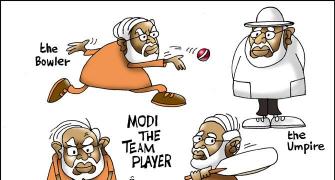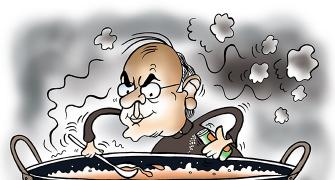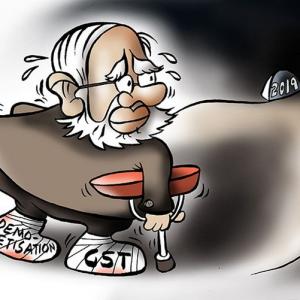'The 5.7% growth in the April-June period is an aberration because of GST.'
'Business activity in the last 15 days of the quarter was minimal or zero.'

Welcoming the Rs 2.11 lakh crore (Rs 1.35 trillion) recapitalisation plan for public sector banks as a monumental decision, Housing Development Finance Corporation Chairman Deepak Parekh says governance reforms and protection of bank managements for decisions on write-offs and settlement for bad loans need attention.
In an interview with Abhijit Lele and Niraj Bhatt, Parekh talks about economic growth, financial services and real estate.
How do you see the opportunities in life insurance?
Insurance is under-penetrated in the country and its future is good.
Insurance penetration in India was just 3.4 per cent at the end of March 2017 against the global average of 6.2 per cent.
So, there is a huge gap as we, as one of the fastest growing nations in the world, are just half the global average.
With demonetisation, a lot of money has come into the banking sector.
This is being invested in mutual funds and insurance due to the tax benefits.
Also, interest rates on bank deposits are coming down, and gold is no longer attractive.
How has the journey for HDFC Life Insurance been?
We were the first private sector life insurance company to get a licence, and we have nurtured it for 17 years.
Now, it is leaving home.
We have tried to see that the culture in HDFC Life Insurance is exactly the same as in HDFC.
Our partner, Standard Life, also has a great reputation.
For the first 10 years, the company made no money. Since then, it is profitable.
We have paid dividend for the last four years.
It has independent management, which is highly motivated and is doing its best to grow the business.
Recent insurance IPOs have not left money on the table for investors.
We hope we have left some money on the table.
 Some of our bankers had asked us to price the issue higher, but we did not take their advice.
Some of our bankers had asked us to price the issue higher, but we did not take their advice.
There is some investor fatigue and recent issues too haven't done well.
So, we reduced the price band significantly to Rs 275 to Rs 290.
With HDFC Life Insurance, the group is coming out with an IPO after two decades. What is planned next?
Yes, it is the fourth listing of the group, but the first one in 22 years.
The fifth listing will not wait for 22 years -- the asset management business will be listed next year, and general insurance in two years.
Will you look at a merger with Max Life after the listing?
No, the chapter is closed. Unless Max restructures, we can't do anything.
What is your view on bank recapitalisation?
It is an unprecedented move because they have taken the next two years into account.
They have not just taken today's non-performing assets, but have also considered what could happen in the next one to two years.
Nobody expected the recapitalisation amount to be as large as Rs 2.11 lakh crore.
It is a well thought out decision as banks are sitting on surplus money after demonetisation.
Many countries in the world have done this, and, in fact, the US and the UK governments made huge profits, as the banks turned around and stock prices soared.
Isn't there a need to bring governance reforms, too?
One thing that needs attention is how we empower PSB (public sector banks) managing directors and senior management to take decisions on writing off debt or to agree to a one-time settlement.
PSB officials are worried about doing that because they may be questioned about it afterwards.
We have to empower them to take decisions and give them the assurance it won't be opened. For that, the government has set up an oversight committee.
Can PSBs compete with private sector banks after this move?
There was lot of talk about consolidation in PSBs.
I think the government has rightly realised that we first need to make them stronger and viable.
There are eight PSBs under prompt corrective action, which puts severe restrictions on them, including not being able to lend to existing customers.
These banks are now getting fresh air (capital) to breathe now.
Now, PSB managements need to be empowered to take decisions and assure them protection.
Let a situation like IDBI Bank executives not happen.
The second thing we need is faster decisions at the National Company Law Tribunal.
The NCLT infrastructure is new and is being built up, but it needs more manpower and more resources.
When do you see the economy recovering?
The 5.7 per cent growth in the April-June 2017 period is an aberration because of the implementation of GST (the Goods and Services Tax) from July 1.
Business activity in the last 15 days of the quarter was minimal or zero, as dealers and distributors were destocking and nobody wanted to be caught on the wrong foot.
It was gross domestic product for two-and-a-half months and not for three months.
The second and third quarter of FY18 will be bumper quarters.
The thrust on road construction and affordable housing is creating jobs and demand.
RERA (the Real Estate (Regulation and Development) Act) has been an excellent move.
What is your outlook on real estate? Is black money out of the system?
Sales are slow at higher-end flats; it is only the actual users buying real estate.
Investors have gone out of the market because neither can they sell nor get returns.
But small flats are still being sold. Our business has grown.
As for black money, there is still some in the approvals process, but at the consumer level, it has practically gone.
Is there space for so many affordable housing finance companies?
Housing as a percentage of GDP was four per cent of it 40 years ago when we started, and has gone up to just nine per cent.
The opportunity is enormous if you want to house every Indian. I do not see a problem in more people coming into housing finance.
However, loan against property is something that I worry about, as it was the home equity loans that went through a tough time in the US.
Some housing finance companies have a very large exposure to loan against property.
MAIN IMAGE: Photograph: Amit Dave/Reuters










